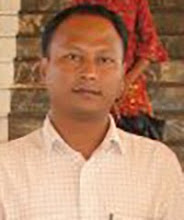BBC’s Burmese
The BBC’s Burmese radio service, the first broadcast media in the Burmese language, marks its 70th anniversary on September 2 of 2010.
The milestone is being celebrated in Mae Sot, Thailand, a border town across the Moei River from Burma, with the distribution of free Hello monthly journals.

A Buddhist monk in Rangoon last month listens to a BBC World Service Burmese-language broadcast. The Burmese service today marked its 70th year of operation; however most of its audience in Burma is forced to tune in secretly because of extensive junta censorship.
The Burma State Broadcasting Service was launched in the Central Telegraph Office in Pansodan, Rangoon in 1939, but it had to move to the principal hill station of Maymyo, near Mandalay, as the turmoil of the Second World War approached. It was then forced to close down when the Japanese occupation commenced.
Some founders of BBC Burmese service were Hla Pe, a Ph.D student at London University, Tat Htut, Tin Maung, Venerable Sayadaw U Thittila, and librarian and musician Khin Zaw. Just after the BBC Burmese service was launched, the Fascist Broadcasting station led by Thi from Tokyo and Thakhin Tun Oak, and the All India Broadcasting service run by Than and Mya Sein were launched to broadcast also in Burmese.
Before 1988, the relationship between Burma and Britain was on warmer terms, so the service was run by employees selected by the Burma State Broadcasting Service. During the 1988 pro-democracy uprising, the BBC was able to report all of the key political events, so many people tuned in. As a result, the Burmese junta refused to allow BBC Burmese service staff to return to the country.
Prominent voices on the service headed by Tin Htar Swe are writer Tint Tel, Khin, Nay Win, Pe Than, Kyi Kyi May, Yin Yin May, Kyaw Zan Tha, Nay Myo Thurein, Min Htet, Thurein Kyaw Zaw, and Ko Ko Aung.
Although the Voice of America Burmese service and two stations in exile provide public broadcasting in Burmese language, the BBC’s service has a larger audience.
The BBC World Service provides content on radio, television, online and mobile phones in 32 languages including English.
It began as a shortwave service known as the BBC Empire Service in 1932, with broadcasts aimed mainly at English speakers in the outposts of the British Empire.
In January, 1938, the first foreign language service, Arabic, was launched. German programmes commenced shortly before the start of the Second World War and by the end of 1942, broadcasts were being made in all major European languages. The Empire Service was renamed the BBC Overseas Service in November 1939 and a BBC European Service was added in 1941. These services were known as the External Services of the BBC.
The External Services gained a special position in international broadcasting during the Second World War, as an alternative news source for a wide range of audiences, especially those in enemy and occupied territories who often had to listen secretly.
Today, most of the audience who listen to the Burmese service in Burma still had to do so in secret because of extensive junta censorship, a BBC World Service radio report on the 70th anniversary said.
That attitude came to the fore during the difficulties with helping victims in the aftermath of Cyclone Nargis in May 2008, and the difficulty reporting on the extent of the disaster.
The BBC reported at the time: “As the junta prevaricated over accepting offers of international aid, stories and images filtered through of the desperation fermenting in the south.”
BBC Burmese service chief Tin Htar Swe said at the time there were many reasons to explain the junta’s attitude.
“Among the benefactors could be journalists, and there could be non-genuine benefactors who want to collect information. They want to stop information coming out of the region … they are paranoid of losing control.”
Author Eric Arthur Blair, aka George Orwell, a policeman in Burma during the 1920s, broadcast many news bulletins and cultural programmes on the Eastern Service during the Second World War, between 1941 and 1943.








|